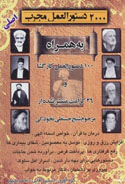کلیپ های دیدنی
مشاوره و خانواده
با توجه به ترک خود ارضایی عوارض آن هنوز در من هست چگونه آن را برطرف کنم ؟
13-08-1399 بازدید:5603 مباحث جنسی و زناشویی همکار پاسخگو

آیا بخاطر وسواس فکری توهین به مقدسات گناه دارد؟
19-05-1398 بازدید:5286 مشکلات و اختلالات روانی همکار پاسخگو
آیا از طریق اینترنت می تواند ازدواج موقت کرد ؟
پرسش: با سلام من 22 سالمه از پارسال با يه دختري در…
از زندگی سیر شدم و آرامش ندارم چکار کنم؟
پرسش : سلام..خواهش ميکنم يه راهي جلو روم بذارين من از…
من از تاریکی شب به دلیل توهمات ذهنیم میترسم چکار کنم؟
پرسش: من وقتي در خانه تنها مي شوم و هوا تاريك…
شب ها كابوس فيلم هاي مبتذل را که قبلا نگاه می کردم میبینم!
پرسش: (در خصوص توبه از ديدن فيلم هاي مبتذل) در اين…
بنده متاهلم و در اینترنت با دختری آشنا شدم که کارمون به گناه کشید!
پرسش: بنده یک مشکلی دارم که می خواستم از شما راهنمایی بخواهم…
جوانی هستم که از زندگی خسته شده و احساس پوچی می کنم!
پرسش: راستش نمی دانم از کجا شروع کنم. 20 ساله هستم…
از طریق اینترنت با پسری آشنا شدم و مدتها با هم در ارتباط بودیم!
پرسش:من دانشجوی ارشد رشته حقوق تقریبا حدود 1 سال پیش…
چرا خانواده ها عاشق شدن را برای جوانان (دختر) بد می دانند؟
پرسش: چرا خانواده ها عاشق شدن را برای جوانان (دختر) بد…
چگونه دیدن فیلم های مبتذل را ترک کنم؟
پرسش: با سلام به حضور حضرت عالي اگرخاطرتان باشد ،من قبلا هم…
با شوهرم قبل از ازدواج رابطه نانشروع داشتم!
پرسش: با سلام من زنی 25 ساله هستم.حدود 1 سال است…
اگر دختری عاشق غیر هم جنس خود...؟
پرسش: اگر دختری عاشق غیر هم جنس خود شود البته نه…
اگر نتوانيم جلو شهوت خود را بگيريم ، چه بايد بكنيم ؟
پرسش: اگر نتوانيم جلو شهوت خود را بگيريم ، چه بايد…
جوانی هستم 21 ساله اهل تهران و تمایل زیادی به سکس دارم
پرسش: من جوانی هستم21 ساله اهل تهران وتمایل زیادی به سکس…
نمي دونم چرا از ازدواج مي ترسم؟!
پرسش: سلام مشکل من اینه که نمي دونم چرا از ازدواج مي…
چرا به زن مطلقه با یک چشم و دید دیگری نگاه می کنند؟!!
پرسش: سلام حاج آقا من یک خانم مطلقه هستم و سوالم اینه…
چرا مخالف رابطه دختر و پسر هستید؟؟!!
پرسش: سلام حاجاقا چند تا سوال داشتم ممنون میشم جواب بدید. 1 چرا…
شب زفاف یا حجله چه شبی است و زن و مرد چکار باید بکنند؟
پرسش: شب زفاف و یا شب حجله که در روایات هم…
چه زمانی برای رابطه جنسی با همسر مناسب است؟
پرسش: چه زمانی برای رابطه جنسی با همسر مناسب است؟ و…
دختری که در سن جوانی و نوجوانی دچار شهوت می شود چه باید بکند؟
پرسش:دختری که درسن جوانی و نوجوانی دچار شهوت می شود…
می خواهم خوب باشم ولی دوست دخترم نمی گذارد!!
پرسش: به دلیل که من مدتی است به شهر آمده ام…
وقتی که عصبانی می شوم دیگر هیچ چیزی دست خودم نیست چکار کنم؟
پرسش: سلام آقای پاسخگو من دارای اخلاق بدی هستم وبا همه خواهر…
من دحتر قبلی نيستم و به يك دختر فاسد تبديل شده ام!
پرسش: من دختري هستم 14ساله من اول دختري سنگين بودم اما…
در مورد وسواسی و راه درمان آن توضیح بفرمایید؟
پرسش: وسواسی چیست و برای درمان آن چه راهکارهایی معرفی می…
خواسگارم بد اخلاق است آیا جواب مثبت بدهم؟
سوال: آیا به پسر بد اخلاق که خواستگاری کرده جواب مثبت…
اخلاقم رُك گفتن است اما حق ميگويم و شوهرم مخالف رفتارم است.
پرسش: اخلاقم رُك گفتن است اما حق ميگويم و شوهرم…
خواستگارم دو ازدواج و یک نامزدی ناموفق داشته جواب مثبت بدم؟
پرسش: خانمی هستم که در گذشته، یک ازدواج_ناموفق داشتم. در حال…
شوهرم گلایه میکنه که چرا همیشه به حرفم گوش میدی!
پرسش: من 20 سالمه 1 ساله ازدواج کردم شوهرم 22 سالشه…
دختر 36 ساله ای که چهره زیبایی ندارد چکار کند؟
پرسش: با سلامدختر 36 ساله اي که مومن و حافظ قرآن…
اختلاف سني پسر با دختر تا چه مقدار ايده آل است؟
پرسش: ميخواستم بدونم ايا ازدواج با دختري که سنش با پسر…
چگونه از انحرافات جنسى به دور باشيم؟
پرسش: در فاصله سنّ بلوغ تا هنگام ازدواج چگونه از انحرافات…
بعضی وقتا اعصابم میریزه بهم با نامزدم بدرفتار میکنم چطورخودمو کنترل کنم؟
پرسش: سلام ببخشید ی سوالی داششتم من دختری۱۸سالم ۷ماهه عقدکردم بعضی…
نقش خانواده در تربيت فرزندان چیست؟
پرسش: نقش خانواده در تربيت فرزندان چیست؟ پاسخ: با سلام و ادب خدمت شما…
نامزدم مي خواهد در كوچه و خيابان آرايش كرده و كمي از موهايم را از روسري بيرون بگذارم!
پرسش: من تا قبل از نامزديم بسيار با حجاب بودم. البته…
چرا برخی مردان در کنار همسرشان آرامش نمی یابند؟
پرسش: قرآن مجيد وجود زن را كانون محبّت و…
علت و شرايط تحقق صيغه چيست؟
پرسش: علت و شرايط تحقق صيغه چيست؟ پاسخ:…
چرا بین دو هوو همیشه اختلاف وجود دارد؟
پرسش: چرا بين دو همسر(زن) با وجود مشروعيّت ازدواج…
پرسش و پاسخ
آیا کسی که شراب بنوشد تا چهل روز نماز و عباداتش قابل قبول نیست ؟
13-08-1399 بازدید:2840 مسائل متفرقه نماز همکار پاسخگو

اذان در جامعه اسلامی نماد چیست ؟ و چرا فقط سه بار در روز تکرار می شود ؟
پرسش: اذان در جامعة اسلامی نماد چیست و…
حکم مشروبات الکلی از دیدگاه اسلام چیست ؟
پرسش: حکم مشروبات الکلی از دیدگاه اسلام چیست…
چرا با این همه ظلم و ستم در جهان امام زمان (عج) ظهور نمی کند ؟
پرسش: چرا با این همه ظلم و ستم…
اگر نگاه به نامحرم گناه است چرا در فیلمهای خارجی زنهای بدون حجاب را نشان میدهند؟
پرسش: چرا میگویند نگاه کردن به نامحرم گناه…

با چه شیوه هایی میتوانیم پیرو انبیاءالهی باشیم ؟
پرسش : چه راه و روشی را پیبگیریم…
چرا زرتشتیان به اعتقاداتشان پایبند هستند ولی مسلمانان نه؟
پرسش : چرا در دین زرتشت گفتار نیک،…
چرا معانی دقیق آیات قرآن مشخص نیست و نیاز به تفسیر دارد ؟
پرسش : به چه دلیل تا تفسیرهای متعدد…
آیا جهت انجام هر کار نامشروعی می توان صیغه جاری کرد ؟
پرسش : اهمیت صیغه کردن در چیست؟ با…
اگر پیامبر (ص) عرب زبان نبود آیا قرآن باز هم به زبان عربی نازل می شد؟
پرسش : اگر حضرت محمد(ص) زبان دیگری به…
آیا در بین پیامبران ،پیامبر خشن هم وجود دارد؟
پرسش : پیامبران به مهربانی معروف میباشند آیا…
با توجه به محاسن روزه آیا معایبی هم در آن هست ؟
پرسش : روزه محاسن بسیاری دارد، آیا این…
جنس خداوند از چه چیزی می باشد و خدا چیست؟
پرسش : جنس خداوند از چه چیزی میباشد…
معنی خدا چیست؟چرا خداوند از حروف دیگر استفاده نکرده است؟
پرسش : تعریف لغوی خدا چیست و چرا…
خال کوبی ابرو (تاتو )از نظر شرعی برای وضو و غسل چه حگمی دارد ؟
پرسش : خالکوبی ابرو (تاتو) از نظر شرعی…
شنیدن صدای زنان در مراسم عزاداری و مولودی چه حکمی دارد ؟
پرسش : شنیدن صدای زنان در مراسم عزاداری…
در چه صورتی امر به معروف و نهی از منکر واجب می شود؟
پرسش : در چه صورتی امر به معروف…
چرا در ایران مردی که از دین خود برگردد حکم اعدام را دارد ؟
پرسش: چرا در ایران مردی که از دین…
آیا ازدواج زن شیعه با مرد سنی اشکال دارد؟
پرسش : آیا ازدواج زن شیعه با مرد…
لمس آیات قرآنی که بر سنگ قبر نوشته شده است بدون وضو چه حکمی دارد ؟
برسش : لمس آیات قرآنی که بر سنگ…
فرق بین احتیاط واجب و احتیاط مستحب چیست؟
پرسش : فرق بین احتیاط واجب و احتیاط…

آیا با زیارت امامان و بوسیدن ضریح آنان انسان دچار شرک می شود؟
پرسش : آیا اعتقاد به این که شیعیان…

چرا در نماز از مهر استفاده میکنیم و فقط پیشانی بر خاک قرار می دهیم؟
پرسش : با توجه به این که هنگام…
آیا علائم هنگام ظهور امام زمان (عج) واقعیت دارد؟
پرسش : آیا وجود نشانههایی هنگام ظهور حضرت…
با وجود مساوات بین زن و مرد چرا مردان در اولویت قرار دارند؟
پرسش : با توجه به این که ما…
طریقه خواندن نماز در زمان رسول خدا (ص) چگونه بوده است؟
پرسش : طریقه نماز خواندن از زمان رسول…
چگونه می توانیم از گناه غیبت پرهیز کنیم؟
پرسش : چگونه میتوانیم از گناه غیبت پرهیز…
چگونه از بدخلقی و صفات زشتم دوری کنم؟
پرسش : چه راهی وجود دارد که انسان…
قطع رابطه با اعضای خانواده که از نظر شخصیتی و اجتماعی مشکل دارند گناه است؟
پرسش : آیا قطع رابطه با افراد خانواده…
آیا روح انسان بعد از مرگ در جسم دیگری دمیده می شود و دوباره به زندگی میکند؟
پرسش : آیا این نظریه درست است که…
اینکه در نماز کاهلی میکنم آیا در دینم خللی ایجاد می شود؟
پرسش : خدا را خیلی دوست دارم،همیشه در…
دلیل علاقه خاص به بعضی از امامان چیست؟
پرسش : چرا برخی برای بعضی امامان ارادات…
در شب اول قبر چه سوالاتی از ما پرسیده می شود ؟
پرسش : شب اوّل قبر چه سئوالاتی از…
آیا دوست داشتن یک نا محرم و ارتباط با او گناه است؟
پرسش : اگر کسی را واقعاً از صمیم قلب…
آیا ادعای ملاقات امام زمان (عج) از جانب برخی افراد صحت دارد ؟
پرسش : بر اساس روایتهای فراوانی امام زمان(عج)…
چرا به اصول و قواعد دین اسلام توجه نمی شود و پذیرش آن از سوی پیروان ادیان دیگر سخت است…
پرسش : دین اسلام کاملترین دینهاست و آسانترین…
آیا نظریه تناسخ از دیدگاه اسلام پذیرفته شده است ؟
پرسش : آیا نظریه تناسخ که بزرگان زیادی…
دست نوشته های طلبه پاسخگو

برای احترام به این ماه هم که شده این کار را انجام بده. مطمئن باش که یاد خدا باعث می شود که هیچوقت به سمت آن اشتباهات نروی.
برای همین یک ماه هم که شده از آن ها صرف نظر کرد و در ضیافت خدا شرکت بنما. بعد از این یک ماه، کیفیت زندگی ات را با گذشته مقایسه کن.
اگر بدتر شده بودی، دوباره به سمت آن گناهان و اشتباهات برو. ولی این ماه چنان عشقی به تو می دهد که دیگر زندگی ات به مانند گذشته نخواهد شد. این ماه خداوند تو را با عشق پذیرایی می کند.
The Goal of Creation (1)
The Goal of Creation (1)
One of the fundamental problems to investigate is the goal of life. Man always asks questions like what he lives for and what his objective in life should be. From the viewpoint of Islam, one would as well ask: "What is the objective and purpose of prophetic missions?" The objective of the prophetic missions is not dissimilar to individual goals of men (peoples), for whom the prophets have been appointed; for, the prophets are sent to guide men towards certain goals. Going one-step further, we could ask: "What is the goal of creation, of man as well as other creatures?
This point requires an exact analysis. It may pertain to 'the goal of the Creator in Creation, the manifestation of His Will and Purpose. We cannot t assume a goal for God, and believe that He wishes to attain something by His acts. Such a supposition implies a shortcoming in the doer of an action, which may be true of creatures with a potential power, but not of the Creator; since it would mean that He intends to move towards perfection and secure something which He does not have. However, sometimes by the goal of creation is meant the goal of the created action, not of the Creator. This would involve the movement of the created towards perfection, not the perfection of the Creator Himself. In this sense, if we think that the nature of creation has always been movement towards perfection, then there is a motive in creation.
This is actually the case, that is, each thing that is created has an independent stage of perfection ahead of it to be attained; and so for everything, there exist stages of deficiency or perfection until the maximum limit is reached. The question of the 'motive in the creation of man' is basically one that refers to the 'nature of man'. It pertains to whatever talents are inherent in him, and whatever individual perfections are possible for him. Once perfections are accomplished by one, we may say he was created for them. There is apparently no need to elaborate on the purpose and goal of the creation of man as a separate topic. It will be sufficient to see what kind of a creature man is, and what abilities are inherent in him. In other words as our discussion concerns the Islamic aspect of the matter, and not a philosophical one, we must see how Islam regards man and his abilities.
Naturally, the mission of the prophets, too, is believed unanimously to facilitate man's perfection and to aid him to remove the deficiencies which neither he, as an individual, nor his society is able to remove. It is only with the aid of their divine revelations that he can advance towards enhancing perfection. Accordingly, every individual must see what he can be after identifying his potentialities, so as to bring them to fruition. That is the goal of our life. So far, the subject is treated in general, now we must go into detail: Whether the Qur'an has discussed the goal of man, and whether it gives the reason for his creations as well as the mission of Prophets.
Very often, we say that man is created for seeking happiness and God neither wants nor gets any benefit from man's Creation. Actually man is destined to choose his way freely, His guidance is a matter of duty and belief, not instinctive and compulsory. So, as he is free, he might as well choose the right way. [The Qur'an: "We have shown man the way to be grateful or ungrateful."](1) But what is happiness according to the Qur'an? It is often said that the purpose of man's creation and prophetic missions is to make man strong in knowledge and resolution, so that he may learn more and more, and secure the power to do what he desires.
Thus the purpose of creating a seed is to realize its potential to become a mature plant. Likewise, a lamb's herbivorous development into sheep manifests a purpose of creation (useful to man. Ed.). Man's potentiality is much superior, he is meant to be knowledgeable and able. The more he knows, the more he can use his knowledge and the nearer he will be to his human goal and purpose.
Sometimes it is said that the goal of human life is happiness in the sense that during the time one is alive, he should live comfortably and happily enjoy the blessings of Creation and nature, suffer less pain from either natural causes or from fellow- creatures. This is considered happiness. This means, then, getting maximum pleasure and minimum pain. It is also said that the prophets too are sent to make it possible for man to secure maximum pleasure and have minimum pain. If the prophets have introduced the subject of the next world, it is meant as a continuation of this life. In other words, as a way has been shown for human happiness and as following, it requires the granting of a reward, and opposition to it involves punishment, this reward and punishment are presented on the models of this world, so that the laws of this world would not be futile. Moreover, as the prophets were in no position as executives in this world to grant rewards or deal punishment, another world had to be offered where the good would be rewarded, and the wicked punished.
But we come across none of these statements in the Qur'an, where the purpose of creating jinn’s and human beings is given as 'worship'.(2) This may seem to us too difficult to understand. Of what use is worship for God? It does not benefit Him. Of what use is it to man? But this point has been explicitly mentioned in the Qur'an as the purpose of Creation. Contrary to the view that the next life is subsidiary to this one, the Qur'an says: "If there were no Resurrection, Creation would be futile." And again it says: "Do you suppose that we have created you in vain?"(3) It is suggestive of something wisely done.
Is it assumed that creation is meaningless, and man does not return to God? In the verses of the Qur'an the question of Resurrection occurs repeatedly with the matter of the rightfulness of creation. Its reasoning is based on the implication that this world has a God, and He does nothing in vain, and all is rightful and not in play, and there is a return to Him who accounts for the whole universe. We never come across this idea in the Qur'an that man is created in order to know more and act more to attain his goal. He is created to worship, and the worship of God is in itself a goal. If there is no question of knowing God which is the preface to worship, then man has failed in his advance towards the goal of creation, and from the viewpoint of the Qur'an he is not happy. The prophets, too, are sent to guide him towards that happiness which is the worship of God.
Thus, the goal and ideal that Islam offers is God, and everything else is preparatory to it, and not of an independent and fundamental importance. In the verses where the Qur'an mentions perfect human beings, or speaks on their behalf, it says they have truly understood the goal of life and endeavored to attain it. It says for Ibrahim ("I have devoted my worship to Him who has created heaven and earth, and I am not a pagan."(4) This Chapter, too, says: "My prayer, worship, life and death are for God, who is the Lord of the Universe."(5)
This monotheism of the Qur'an is not merely an intellectual one, thinking that the origin of universe is one thing and its Creator is another. It includes the faith and conviction of man that there is only one Creator, and his goal, which is the only worthy one, is He alone. All other goals are the product of this one and subsidiary to it.
Continue in the next article: ( The Goal of Creation (2) )
NOTES:
1. [The Qur'an, 76: 3]
2. [The Qur'an, 51:56]
3. [The Qur'an, 23:115]
4. [The Qur'an, 6:80]
5. [The Qur'an, 6:163]
وبگــــــــــردی طلبۀ پاسخگو
- فایل اعمال و رفتار های خلاف قانون جناب آقای حسن روحانی
- در کنج خانه طلبهها چه میگذرد؟
- سکوت چند ساله مسئولان حوزه در قبال حملات وحشیانه به طلاب!
- می گویند که مملکت مملکت آخوندهاست!!
- یک ماجرای تلخ که خانم ها با تأمل بیشتر بخونند
- جریان های تکفیری موجود در عراق و نحوه شکل گیری آنها
- سیر تکاملی تفکر سلفیه چگونه بوده است؟
- بداء در قرآن و حدیث چگونه مطرح شده است؟
- پیامبر (ص) با مخالفین خود چگونه بر خورد می کرد؟
- سبک زندگی حضرت زهرا سلام الله علیها
- ملاک کرامت و شرافت افراد، انسانیت است یا جنسیت؟
- رنگ و پوشش های رنگی در اسلام
- حجاب، زنان را افسرده میکند و مانع پیشرفت اجتماعی آنهاست!!!
- علوم لدنی معصومین
- مگر ولی فقیه معصوم است که ولایت مطلقه دارد؟
- اگر خدا ازعاقبت ما اطلاع دارد قیامت برای چیست؟
- آیا بجای نماز خوندن، پیانو یا سه تار بزنم؟
- چرا مراسم عزاداري امام حسين(ع) پيش از شهادت ايشان صورت ميگيرد؟
- چرا امام حسين(ع) در كربلا براي رفع تشنگي از خداوند طلب باران نكرد؟
دانــــــلود های مفیـــــــــــــــــــد
- دانلود پاورپوینت شناخت وهابیت و صهیونیسم و ارتباط با همدیگر
- دانلود دو پاورپوینت اجرای عید غدیر خم
- دانلود پاورپوینت احتجاج اميرمؤمنان (ع) به غدير
- پژوهشی در کلام و پیام مقام معظم رهبری پیرامون ماه رمضان
- خطبه شعبانیه و خطبه امیرالمومنین(علیه السلام) پیرامون روزه و ماه رمضان
- دانلود پاورپوینت و pdf تفاوت های زن و مرد
- دانلود جزوه ساعات سعد و نحس(زمان نوشتن دعا)
- تقویم مذهبی شمیم یار 96 مخصوص کامپیوتر
- دانلود نرم افزار «شیعه شناسی»
- دانلود پاورپوینت ساختار خانواده و مسایل آن
- دانلود کتاب دایره المعارف جنسی
- دانلود نکات جذاب دوران عقد
- دانلود کتاب درمان سرد مزاجی و بی میلی جنسی بانوان
- دانلود کتاب حسادت کودکان
- دانلود کتاب درمان خستگی وناتوانی جنسی
- دانلود پاور پوینت اسیب های ازدواج وخانواده
- دانلود پاورپوینت هشت گام برای تحقق رویا به واقعیت
- دانلود پاورپوینت تقویت اراده
- دانلود پاورپوینت موفقیت وروشهای رسیدن به ان
- دانلود پاورپوینت هنر رفتار با افراد دشوار
- دانلود پاورپوینت جملات جالب وجذاب روحیه بخش بزرگان
- دانلود پاورپوینت راههای مقابله ودرمان استرس
- دانلود پاورپوینت نیازهای اساسی کودکان
منبــــرهای مکــــــــــــــــــتوب
- منبر مکتوب: روز عرفه و فرصت ها
- منبر مکتوب: سبک زندگی امام باقر علیه السلام
- منبر مکتوب: سه نیاز مومن (امام جواد علیه السلام)
- سخنرانی سلسله ای و چند جلسه ای مناسبت ماه رمضان
- دانلود 30 جلسه سخنرانی ماه مبارک با موضوع تنها مسیر
- موضوعات پیشنهادی سخنرانی برای محرم
- فضائل حضرت قمر بنی هاشم علیه السلام
- برکات وجود ابا عبدالله علیه السلام بر عالم
- بررسی بُعد اخلاقی،عبادی و عرفانی عاشورا
- آخرين وصيت امام حسين عليه السلام
- اولین علت رویاروی در کربلا؛ دوری از یاد خدا
- هميشه حزن؟ شادي چرا نه؟ - شب دهم محرم
- چرا نفرين ؟ - شب نهم محرم
- نماز ظهر عاشورا - شب هشتم محرم
- فلسفه عزاداری - شب هفتم محرم
- دفاع از دین - شب ششم محرم
- فلسفه حضور خانواده سيد الشهداء - شب پنجم محرم
- علم امام علیه السلام به شهادت - شب چهارم محرم
- فقدان شرایط امر به معروف و نهی از منکر- شب سوم محرم
مناظرات طلبه پاسخگو
بیشترین دانلود ها
- دانلود صوتي تکنیک های نزدیکی زن و شوهر (108115)
- دانلود رایگان کتاب خواص سوره های قرآن (54852)
- دانلود پاورپوینت بسیار مفید مهارت های زندگی (37478)
- دانلود پاورپوینت و pdf تفاوت های زن و مرد (33924)
- دانلود كتاب مسائل جنسي و زناشوئي در احاديث (33810)
- دانلود کتاب دایره المعارف جنسی (31940)
- دانلود پاورپوینت های آموزش پیش از ازدواج (30556)
- دانلود بسیار مفید پاورپوینت آئین همسرداری (29943)
- دانلود پاورپوینت آموزشی بررسی رابطه دختر و پسر (29591)
- دانلود 110جلد کتاب بحارالانوار علامه مجلسی ره (29550)
- دانلود كتاب دختران خوب به آسمان می روند دختران بد به همه جا (28536)
- دانلود کتاب آموزش جنسی آقایان (28332)
- دانلود كتاب فرق و مذاهب كلامي استاد رباني گلپايگاني (28263)
- دانلود کتاب درمان سرد مزاجی و بی میلی جنسی بانوان (28124)
- دانلود نکات جذاب دوران عقد (27690)
- دانلود نرم افزار «شیعه شناسی» (26003)
- دانلود کتاب درمان خستگی وناتوانی جنسی (25239)
- دانلود پاورپوینت تقویت اراده (23709)
جدیدترین مطالب سایت
- پاسخ به شبهات ولایت (4693) بازدید
- پاسخ به شبهات ولایت (4489) بازدید
- اذان در جامعه اسلامی نماد چیست ؟ و چرا فقط سه بار در روز تکرار می شود ؟ (3896) بازدید
- باتوجه به عادل بودن خداوند چرا بعضی از انسانها را ناقص الخلقه آفریده است ؟ (3982) بازدید
- ویژگی خاص قرآن چیست که کسی نمی تواند مانند آن را بیاورد ؟ (4216) بازدید
- با توجه به ترک خود ارضایی عوارض آن هنوز در من هست چگونه آن را برطرف کنم ؟ (5603) بازدید
- آیا بدن اخروی مانند بدن مادی است ؟چهره ی واقعی انسان در قیامت چگونه است ؟ (4999) بازدید
- آیا ادعای ملاقات امام زمان (عج) از جانب برخی افراد صحت دارد ؟ (4503) بازدید
- چرا به اصول و قواعد دین اسلام توجه نمی شود و پذیرش آن از سوی پیروان ادیان دیگر سخت است ؟ (4880) بازدید
- فلسفه وجود لباس روحانیت در عصر حاضر چیست ؟ (3552) بازدید
- آیا وظیفه یک روحانی تنها راهنمایی مردم و فعالیت و تدریس در حوزه هاست ؟ (2947) بازدید
- آیا نظریه تناسخ از دیدگاه اسلام پذیرفته شده است ؟ (5231) بازدید
- آیا توصیف بهشت و جهنم در قرآن تمثیل هایی برای درک بهتر آن جهان است ؟ (4835) بازدید
- با توجه به اینکه اسلام کاملترین دین هست چرا ما نسبت به کشور های غیر مسلمان عقب مانده تر هستیم ؟ (6734) بازدید
- نقش امام و رهبر در جامعه اسلامی چیست ؟ و اگر نباشد چه اتفاقی می افتد ؟ (4544) بازدید
پربازدیدترین های سایت
- زنی هستم که میخواهم به شوهرم خیانت کنم!!! (605416)
- آيا زن شوهر دار بخاطر رفع نیاز جنسی اش ميتواند صیغه شود؟ (501095)
- دوست دخترم حامله شده چکار کنم؟ (398618)
- میل جنسی زیادی دارم و به شدت داره منو عذاب می ده (340580)
- دیدن فیلم های مبتذل زن و شوهر برای تحریک شدن جنسی (217850)
- چگونه همسرمان را آماده آميزش جنسي كنم؟+18 (213155)
- حکم شرعی نزدیکی از پشت! (208124)
- خانم هایی که می خواهند طلبه شوند بخوانند!!! (205625)
- زنم رابطه جنسی برقرار نمیکند!!! (199686)
- از تجربه های تلخ و تکان دهنده دختران بخوانید شاید... (172412)
- گناه با محارم خود داشتم! (146413)
- رابطه جنسی دهانی حكم چيست؟ (130946)
- محرمات و مکروهات و مستحبات حائض+حکم ورد به امکان مقدسه (129515)
- به رابطه خانمم با خواهر زاده اش مشکوکم؟ (123347)
- سفارش اسلام در مورد آمیزش صحیح چیست؟ (99066)
- نام كتاب حضرت نوح و حضرت ابراهیم؟ (97062)
- با زنان چشم سبز ازدواج نکنیم؟ (94780)






















































